1. BACAČI DOBILI NAGRADU "AVAZOV ZMAJ" U SARAJEVU:
U listopadu, 21. i 22. Ex-pozicija je igrala na ovogodišnjem 48.
MESS-u u sklopu svjetske premijere cijele trilogije "Proces_grad" ("
Odmor od povijesti", "Ex-pozicija" i ("
process_in_progress". Kao i ostala dva dijela trilogije dobila je nagradu "
Avazov zmaj" specijalnog žirija lista
Dnevni Avaz. SARAJEVO HVALA!!!

Ex-pozicija se mijenja:
U ovogodišnjim igranjima Ex-pozicije možete uživati u tri nove priče: Antonije Stanišić, Alle Valle & Petre Zanki. Uskoro nam se iz USA vraća Ena Schulz te sveukupno možete vidjeti, proputovati, čuti i osjetiti 9 priča/putovanja. Svakako dođite!!!
Glasine:
Šuška se o još nekim gostovanjima, pa pratite vijesti-novosti na blogu.
Uskoro će također biti audicija za nove suradnike pa vas pozivamo da nam pošaljete svoje kontakte.
Vidimo se.
2.
"Ex-pozicija" je 24. i 25. srpnja gostovala u mađarskom gradu Segedinu (Szeged) na 18. međunarodnom festivalu
THEALTER.

Fotografije sa gostovanja u Mađarskoj pogledajte
ovdje.
Hvala svima koji su nas posjetili u Zagrebu na predstavama 18, 19 i 20 travnja. Bili ste nezaboravni i divna publika - opet!
Slijedece predstave u Hrvatskoj (najvjerovatnije) će biti u Zagrebu u drugoj polovini travnja 2009.
Svi koji žele dobiti informacije o tom igranju neka nam pošalju svoju e-mail adresu. Uskoro će se znati točni datumi, vremena i mjesto igranja (moguće je da ćemo promijeniti lokaciju igranja u Zagrebu!?) kao i gdje možete doći do karata
Informacije, sugestije i primjedbe na broj 098 28 73 73 te na e-mail bacaci_sjenki@europe.com.
2.
Prema mišljenju kazališnih kritičara u susjednoj Srbiji hrvatska predstava «Ex-pozicija" Bacača Sjenki predstavlja vrhunac proslogodišnje sezone (2007.).
Tako legendarni kritičar tjednika NIN, Vladimir Stamenković, stavlja "Ex-poziciju" na sam vrh svoje liste, ispred svih domaćih i stranih predstava i gostovanja, ističući da Expozicija "suštinski je proširivala i produbljavala pojam dramatičnog u teatru." , a Aleksandra Glovacki iz Večernjih Novosti na četvrto mjesto, iza Jurgena Goscha i slavnog "Macbetha", "Barbela" Dejana Mijača i Biljane Srbljenović te predstave "Hitler i Hitler", Ateljea 212. I ostali kritičari navode "Ex-poziciju" kao poseban događaj sezone i prizivaju njezino ponovno gostovanje.
3.
Hvala, zaista hvala svima koji su nas posjetili u Zagrebu: (tvornica Gorica, 2. kat, Šubiceva 55.) 18. i 20. listopada 2007. kada je Expozicija prikazana u okviru "
Best of Croatian Theatre" Showcase-u koji je organizirao Hrvatski Centar ITI-UNESCO (International Theatre Institute). Meditirajte zajedno s nama u nadi da će dio bivše tvornice Gorica ostati na korištenje Bacača Sjenki i time omogućiti da se igranje Expozicije u Zagrebu nastavi.
3.
Za vaše komentare i primjedbe pišite na bacaci_sjenki@europe.com.
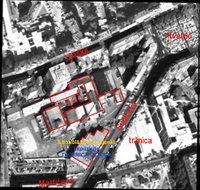
4.
Expozicija je jednoglasnom odlukom dobila Specijalnu nagradu međunarodnog stručnog žirija ovogodišnjeg 41. međunarodnog kazališnog festivala BITEF u Beogradu, te drugu nagradu publike, dok joj je prva izmakla za ciglih 0,01%. Ex-pozicija je igrana od 27. do 29. rujna 2007. u terminima od 12.00 do 18.30h. Prostor u kojem se predstava igrala je bivša robna kuća KLUZ u Masarykovoj ul. br. 4., a na uglu s Resavskom ulicom. Za informacije o festivalu i nagradi: www.bitef.co.yu.

7.
Expozicija je nedavno prikazana (12. i 13. rujna) i na ovogodišnjem Festivalu internacionalnog alternativnog teatra FIAT koji se održao u Podgorici od 08. do 30. rujna 2007. Više o tome na našem Weblogu.
Predstava se igrala u Podgorici u Grand
Hotelu Crna Gora u Bulevaru Sv. Petra Cetinjskog 2. Ulaz (početak predstave) u predstavu bio je svakih 20 minuta (od 12 do 18 h) u kavani (podgoričani je zovu Bašta!) hotela na za tu priliku označenom stolu.


8.
HVALA SVIMA KOJI SU NAS POSJETILI NA
BOK FESTIVALU U BJELOVARU I NA NEPOKORENOM GRADU (
SPRAVIŠĆU) U
KRIŽEVCIMA .

Za ostale informacije: bacaci_sjenki@europe.com
Za predbiljezbe zovite:
+385 1 462 08 60 (10-16h)
+385 98 28 73 73 (12-18h)
Ex-pozicija je do sada učestvovala na slijedećim festivalima i manifestacijama:
Urbanfestival Zagreb, srpanj, 2005.
Eurokaz - Zagreb, lipanj, 2006.
Bokfest - Bjelovar, travanj/svibanj, 2007.
Festival Nepokoreni grad - Spravišće - Križevci, srpanj, 2007.
FIAT, Podgorica, Crna Gora, rujan, 2007.
BITEF - Beogradski medjunarodni teatarski festival, Srbija, rujan 2007.
3. Hrvatski kazališni Showcase - Zagreb, 17-21, listopada, 2007.
THEALTER, Segedin, Mađarska, srpanj, 2008.
48. MESS - 18-29, listopada, Sarajevo, Bosna i Hercegovina, listopad, 2008.
PSI#15, Zagreb, Croatia, lipanj, 2009.
15. PUF - Pula, 1-5 srpnja, 2009.
5. Hrvatski kazališni Showcase - Zagreb, studeni, 2009.
DESIRE, Subotica, Srbija, studeni 2009.
Predstava Ex-pozicija, je bila nominirana za nagradu Hrvatskog Glumišta (nagrada HDDU) u kategoriji najbolja režija u Hrvatskoj u 2006. Više o tome pročitajte ovdje.
“Individualiziranost performera i njihovih »navigacija« prostorom svakako je ogromna vrlina ove predstave, no još se važnijim čini otvaranje različitih političkih polja, poput građanske sukrivnje zbog hrvatskog nacionalizma, zatim problema gradskog zapuštanja kompletnog tvorničkog prostora (»nestajanja« čitavih sustava zapošljavanja i načina rada), kao i umjetničke kritike samog obrasca tvorničkog »rada«, svedenog na bespomoćno, ponižavajuće rintanje za sitan novac. Boris Bakal s grupom autonomnih suradnika stoga je ostvario jedan od najzanimljivijih kazališnih projekata sezone, čija prostorna marginaliziranost izvedbi nipošto ne oduzima moć umjetničke istinitosti. Dapače: čini se da prljavština i prašina napuštene tvornice više govore o zrelom kapitalizmu negoli su to u stanju konvencionalno »dotjerana« kazališna zdanja.”
(Nataša Govedić, Putovanje kolektivnom krivnjom, Novi list, 29.10.2006.)
"U odnosu na ovogodišnji slogan o intimi, najrafiniranija predstava Eurokaza, nešto kao nježnost koja hoda, bila je predstava "Ex-pozicija" Borisa Bakala i grupe Bacači sjenki, u kojoj su glumci držeći za ruke – jednog po jednog – vodili gledaoce zavezanih očiju i toplinom koja ništa ne košta pričali im priče koje su ovi davno zaboravili."
Bojan Munjin, "
Shakespeare na kokainu", Feral Tribune
“Mnoge se predstave i projekti Borisa Bakala referiraju na prostor kao vidljivu površinu unutarnje devastacije (tipično geslo skupine Bacači sjenki glasi: Čovjek je prostor), odnosno na prostor kao “arhiv” različitih političkih osporavanja ljudske slobode, kao i ljudskog trajanja (…)
Umjetnost je postigla ono što izmiče golom aktivizmu: stvorila je osobitu zonu kreativne i kritičke vidljivosti, poklonila je izdržljivost lokaciji kojoj je prije Eks-pozicije prijetio skori nestanak, pokazala je da grad živi u čovjeku koji čuva njegova zdanja, a ne samo u nedokučivom urbanističkom planiranju, kao i da umjetnost može stvoriti osobitu vrstu azila za arhitektonske “gubitnike” i “bezemljaše”. Legitimiranje prostora izvedbenim fikcijama veoma je vrijedno i iz užekazališnog aspekta: u Bakalovim projektima čitav grad poprima obrise kazališta, širi se izvan ravnateljskih politika, pozornica više ne potpada pod pasku državnih institucija, razglobljene su granice privatnog vlasništva i općeg dobra, dramske priče i scenskog objekta, performera i gledatelja.”
(Nataša Govedić,
Polit-lokalizacija žive riječi, Zarez br. 192, 16.11.2006.)
“Da nije bilo Bobe Jelčića, ZKM-a, Bacača sjenki i dramskog pisca Mate Matišića, ova kazališna godina prošla bi nezapaženo gotovo kao da je nije ni bilo.”
(Bojan Munjin,
Godina sjenki, Feral Tribune, 27.12.2006.)
“Razlika je bila toliko drastična da se osjetila čak i nominacijama za Nagradu hrvatskog glumišta, u čijoj se selekciji (prvi put u povijesti ove američki konzervativno osmišljene nagrade) pojavio Boris Bakal, nominiran za režiju »Eks-pozicije«, predstave koja izravno tematizira kontrolu javnih prostora te posebno arhitektonskog statusa propale zagrebačke tvornice Gorica. Bakal je na kraju ostao bez nagrade, ali definitivno je uznemirio domaće poimanje »velike predstave«.”
(Nataša Govedić, Prevagnula umjetnost izvan institucija, Novi list, 31.12.2006.)
"Tako svaki posjetitelj, kao u pojednostavnjenim mitološkim koncepcijama, od Ex-pozicije dobiva onoliko koliko sam u nju donese, jer čak i kad je u zaista čvrsto strukturiranoj priči, njegova je pasivnost zapravo privid ispod kojega je itekako aktivno suzbijanje nevjerice i, na kraju krajeva, pristajanje na šetnju."
Igor Ružić, "
Duhovi iz kuće priča", Vijenac
""Ex-pozicija" se na metafizičkom planu tiče Kafke i bazira na svijesti o zarobljenosti čovjeka u vlastito tijelo, povijest i grubu stvarnost koja mu govori da snove izbaci iz glave i da pazi tko mu je iza leđa, ali praktično gledano fascinantan je bio naknadni doživljaj publike koja je na tom virtualnom putovanju eksplodirala izbacivši iz sebe lavu ružnih događaja koji joj se neprestano vraćaju kao i onih lijepih koje je bila prisiljena zaboraviti.
Među publikom koja je "potpuno odlijepila", jedni su plakali, drugi su izlazili egzaltirano, a treći skidali povez jer nisu mogli izdržati do kraja, no karakteristično je mišljenje Aleksandre Jovičević, profesorice na Fakultetu dramskih umjetnosti u Beogradu: "Ova predstava pomera granice pozorišta jer prisiljava publiku da izađe iz zaštićene zone gledališta i da sudeluje. 'Ex-pozicija' je brehtijanska predstava na način Stanislavskog jer potpunim uživljavanjem u imaginarno briše svaku pozorišnu iluziju i traži od gledaoca da se bez foliranja suoči sam sa sobom." "Ex-pozicija" je na BITEF-u dobila tek specijalnu nagradu od međunarodnog žirija koji je zasjedao do dva ujutro svađajući se da li da nagrade podijeli zaista novim kazališnim tendencijama (što jest zaštitni znak festivala sve ove godine) ili – starom dobrom vinu."
Bojan Munin,
"Počasni krug kredom"Feral Tribune, 4.listopada, 2007
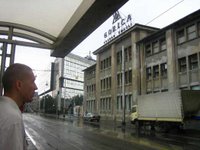
******************
Ispričavamo se svima onima koji nisu uspjeli vidjeti našu predstavu “Ex-pozicija” na Urbanom Festivalu 2005. u rujnu mjesecu, onima koji je nisu uspjeli vidjeti u srpnju ove godine na 20. jubilarnom Eurokazu, te isto tako onima koji su je propustili u jesenjskom izdanju od 19. do 26. listopada 2006., također nam je vrlo žao što ste to propustili u travnju i svibnju 2007. u Zagrebu, Bjelovaru i Križevcima, a posebice ako to niste uspjeli ni u Podgorici ni u Beogradu netom završenog rujna. Stoga se ovom prilikom unaprijed ispričavamo i onima koji je možda neće vidjeti niti u budućnosti, kada je budemo ponovo igrali u Zagrebu, Bologni, Oslu, Skopju, Budimpešti, Berlinu, Rijeci, Zadru i možda negdje drugdje.
Jednostavno - to je dio te predstave.
I za prve, i za druge, i za treće - malo podsjećanje o kome i čemu je riječ, te čemu sve to:

Urbani kazališni projekt EX-POZICIJA nastaje na temelju eseja talijanskog filozofa Giorgija Agambena SUDNJI DAN, a inspiraciju crpi iz Kafkine priče LEGENDA O ZAKONU. Ostale reference predstave su brojne: Jeunetov film Amélie, Wallesov film Proces, Shakespearov Kral Lear, kao i prijašnji radovi Shadow Castersa. Projekt EX-POZICIJA drugi je dio trilogije PROCES_GRAD, koja je započela 2004., na 13. Danima hrvatskog filma svojim trećim dijelom, PROCESS_IN_PROGRESS.
Redatelj i autor koncepta: Boris Bakal
Dramaturgija: Boris Bakal, Katarina Pejović i Stanko Juzbašić
Glazba i zvukovi: Stanko Juzbašić
Autori i izvođači: Boris Bakal, Boris Beštak, Mladen Hrvoje Ilić, Stanko Juzbašić, Jelena Lopatić, Emil Matešić, Bojan Navojec, Katarina Pejović, Ena Schulz, Antonija Stanišić, Alle Valle, Nina Violić, Tanja Vrvilo, Petra Zanki
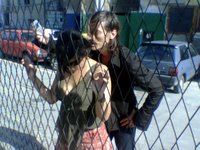
Posebno sudjelovanje: Tomislav Jurčec
Scenografija: Boris Bakal (Dragan Mileusnić)
Kostimi: Martina Franić
Suradnici: Iva Aras, Maja Bučić, Ognjen Bogojević, Ivan Bauk, Mario Mavrin, Milan Žerjav
Asistent produkcije/mediji: Vanja Žanko
Oblikovanje plakata: Željko Serdarević & Dragan Mileusnić
Produkcija: Bacači Sjenki
Koprodukcija: UrbanFestival 2005, Orchestra Stolpnik (Bologna), Veletržnice Zagreb
Potpore: Ministarstvo kulture Republike Hrvatske, Ured za kulturu, obrazovanje i sport grada Zagreba.
Donacije: Zagrebačka Banka 2005
Posebne zahvale: Damir Bartol Indoš, Damir Klemenić, Ratko Perica i Ivana Perković
Fotografije: Katarina Pejović, Vesna Vuković, Boris Bakal, Ivan Slipčević, Srđan Kovačević i Srećko Horvat.
O prijašnjim nastupima pogledati i na:
eurokaz 2006
urbanfestival 2005
vijenac, br. 322, 06. srpnja 2006.
feral tribune, 06. srpnja 2006.
webzin: F.I.L.M.
webzin: Kupus, (Ivan Kralj, Eurokaz post-festum)
Radio 101
Andrija Tunjić, Nadilaženje jezika i kultura, Vjesnik, 1. srpnja 2006
Igor Ružić, Radio 101, Godišnji pregled 2006: Kazalište
Sandro Novosel, Izlaganje i izmještanje - kazališna atrakcija godine u Križevcima, 12. lipnja 2007
Ivana Matijević, Danas, 29. rujna, 2007. "Ex-pozicija" bacača sjenki pozorište "jedan na jedan"
Ana Tasić, Politika, 02. listopada, 2007. "Beskrajno inspirativno"(BITEF 41.)
Renate Klett, Neue Zürcher Zeitung, 04. listopada, 2007. "Tko ne može vidjeti, mora osjetiti"(BITEF 41.)
Bojan Munjin, Feral Tribune, 4. listopada, 2007. "Počasni krug kredom"
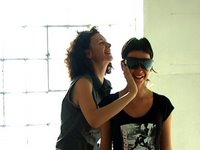
Dodatne informacije i predbilježbe na telefone:
Bacači Sjenki
+385 98 28 73 73
+385 91 738 95 06
+385 1 464 02 62
ili na mail: bacaci_sjenki@europe.com
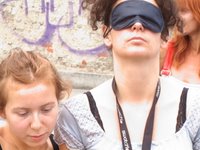
Adresa predstave:
U Zagrebu: o. škola Dr. Ivan Merz
ul. Račkoga 6, Zagreb, Hrvatska
Medijski pokrovitelji:
Radio 101
Monitor
Z1















